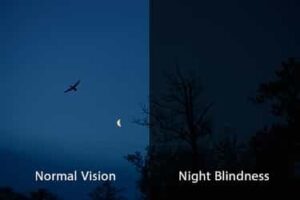
Anushka Super Speciality Eye Hospital
Call: 90044 44422 / 99213 44422 | Timings : 8.30 a.m to 5.30 p.m (Mon-Sat) | Add: Shri Swami Samarth Soc, Kaneri Dhamankar Naka, Bhiwandi




Accredited for Quality Care
Eye Floaters: Causes, Symptoms, Treatment Options & Frequently Asked Questions
anushka
9 June 2025
What Are Eye Floaters?
Have you ever noticed small, shadowy shapes drifting across your field of vision—like spots, threads, cobwebs, or squiggly lines? These are known as eye floaters. They are a common occurrence and usually harmless, though they can sometimes indicate a serious underlying condition that requires medical attention.
What Do Eye Floaters Look Like?
Eye floaters may appear as:
- Gray or black spots
- Cobweb-like stringsThread-like or squiggly lines
- Small shadowy shapes that drift when you move your eyes
- Most floaters become noticeable when looking at a bright, plain background like a clear sky or a white wall.
Causes of Eye Floaters
Floaters occur when the vitreous humor, a gel-like substance in the eye, begins to liquefy or shrink. This causes tiny fibers to clump together and cast shadows on the retina. Common causes include:
- Aging:
The most common cause is age-related changes to the vitreous. As people age, the vitreous starts to liquefy and pull away from the retina, causing floaters.
- Posterior Vitreous Detachment (PVD)
PVD occurs when the vitreous completely detaches from the retina. It’s common in people over 50 and often causes a sudden increase in floaters.
- Myopia (Nearsightedness)
People with high myopia have elongated eyeballs, making them more prone to floaters and retinal issues.
- Eye Trauma
Injuries to the eye may disturb the vitreous, causing floaters to appear suddenly.
- Inflammation (Uveitis)
Inflammation inside the eye, particularly in the uvea, can lead to floaters due to cellular debris floating in the vitreous.
- Retinal Tears or Detachment
Sometimes, floaters are a warning sign of retinal tear or detachment, especially when accompanied by flashes of light or vision loss.
Symptoms of Eye Floaters
- Moving shapes or threads in the vision
- Floaters that drift when the eyes move
- Increased visibility in bright lighting
- Shadows that disappear when you try to look at them directly
- Accompanied flashes of light or vision loss (urgent)
When to See an Eye Doctor
- While floaters are often harmless, you should seek immediate medical attention if:
- You notice a sudden increase in floaters
- Flashes of light appear with floaters
- You experience peripheral vision loss
- You’ve had recent eye trauma or surgery
- These may be signs of a retinal tear or detachment, which can lead to permanent vision loss if not treated promptly.
Diagnosis of Eye Floaters
- An ophthalmologist or optometrist can diagnose floaters using:
- Dilated eye exam
- Ophthalmoscopy
- Slit-lamp examination
- Optical coherence tomography (OCT)
- Ultrasound imaging (if the retina cannot be seen clearly)
Treatment for Eye Floaters
1.Observation
In most cases, no treatment is required. Floaters often become less noticeable over time as your brain learns to ignore them.
2.Vitrectomy
A surgical procedure in which the vitreous gel is removed and replaced with a saline solution. This is usually reserved for severe cases where vision is significantly affected.
3.Laser Therapy (Laser Vitreolysis)
A non-invasive procedure where a laser breaks up floaters. Not suitable for all types and locations of floaters.
Can Eye Floaters Be Prevented?
Although you can’t always prevent floaters, the following steps may help:
- Regular eye exams to detect early changes
- Protect your eyes from trauma
- Manage chronic conditions like diabetes and hypertension
- Maintain eye health with a balanced diet rich in antioxidants
Living with Eye Floaters
For most people, floaters become less noticeable with time. Tips to cope include:
- Avoid staring at bright backgrounds
- Wear sunglasses in bright sunlight
- Keep your eyes well-lubricated
- Stay calm—stress can make floaters feel more intrusive
Frequently Asked Questions About Contact Lenses
Q1. Are eye floaters dangerous?
Most floaters are harmless. However, if they appear suddenly or are accompanied by light flashes or vision loss, consult an eye doctor immediately.
Q2. Will eye floaters go away on their own?
Many floaters fade or become less bothersome over time. Your brain often adapts to their presence.
Q3. Can I treat floaters naturally at home?
There is no scientifically proven natural cure for floaters. Maintaining good eye health through proper nutrition and regular check-ups is your best preventive measure.
Q4. Can floaters lead to blindness?
Floaters themselves do not cause blindness, but if caused by a retinal tear or detachment, it can lead to permanent vision loss without treatment.
Q5. Is laser treatment safe for floaters?
Laser vitreolysis is generally safe but not suitable for everyone. Consult an ophthalmologist to assess if you’re a good candidate.
Q6. Are floaters more common after cataract surgery?
Some people notice floaters after cataract surgery due to changes in the vitreous or improved clarity of vision. Most are harmless but should be checked by your surgeon.
Conclusion
Eye floaters are a natural part of aging for many, but they shouldn’t be ignored—especially if symptoms change rapidly. Regular eye check-ups are vital for monitoring your eye health and ruling out serious conditions.If you’re experiencing disturbing floaters or any accompanying vision symptoms, book an appointment with your eye care professional today. Early detection can protect your sight and give you peace of mind.
Recent Posts


